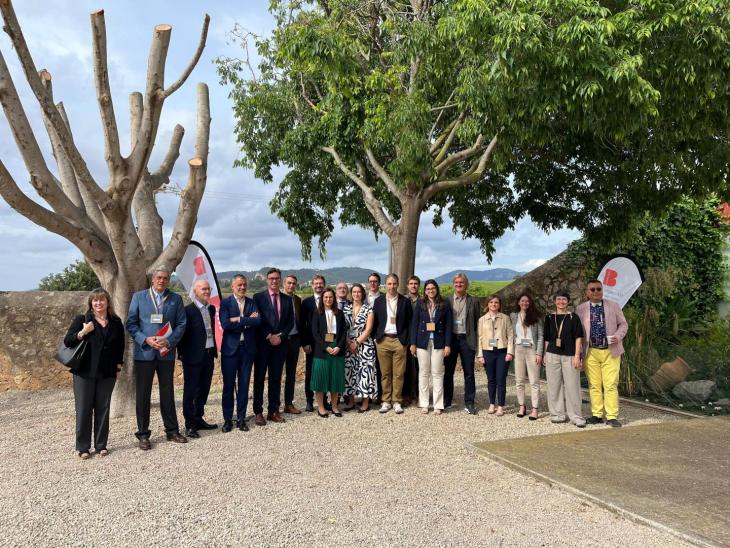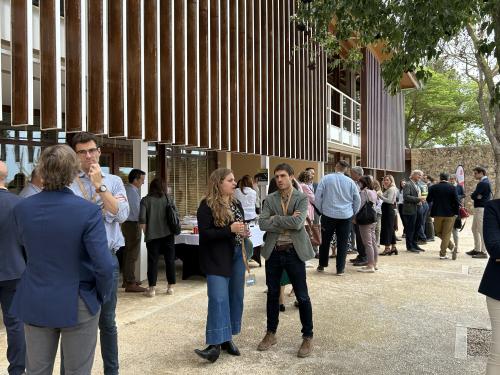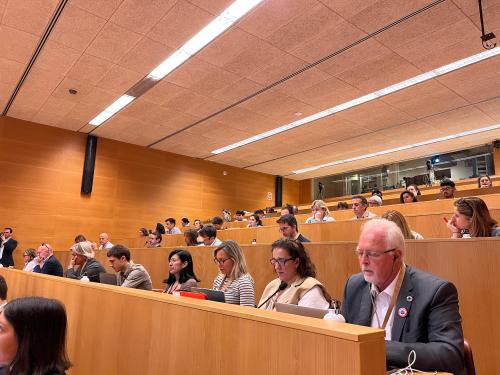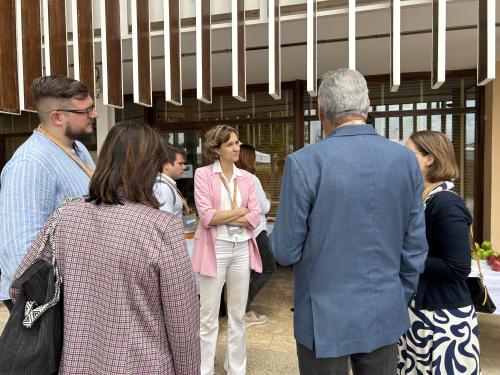Cluster meet Regions in Palma: Circularity as a Regional Growth Strategy
On 14-15 May 2025, Palma became the focal point for a groundbreaking conversation on transforming Europe’s economy — from a linear take-make-waste model to a sustainable, circular future. The recent Clusters meet Regions event gathered business clusters, policymakers, and innovators to explore how regional collaboration can accelerate the transition to circular economy practices, boosting European resource efficiency and resilience.
The Balearic Islands, long known for their booming tourism industry, are rapidly reinventing themselves as hubs of innovation and sustainability, championing new ways to balance economic growth with environmental responsibility. Highlighting the islands’ growing role as a “Regional Valley of Innovation,” this gathering underscored the region's unique strengths—ranging from tourism and marine technologies to renewable energy and creative industries—and the Balearic Islands’ commitment to circular economy as cornerstones for future competitiveness and regional prosperity.
|
|
Organised by the European Cluster Collaboration Platform (ECCP) on behalf of the European Commission, in partnership with the General Directorate of Innovation and Digital Transformation of the Government of the Balearic Islands and Fundació Bit, the Clusters Meet Regions event brought together 110 participants from 16 countries.
Day 1: A Strategic Shift for the Balearic Economy
The circular economy offers a transformative approach, moving beyond traditional linear models of production and consumption to one that maximises resource efficiency, reduces waste, and fosters local economic resilience. The government of the Balearics Islands is working on launching a regional vision aligned with the regional research and innovation strategy for intelligent, focused, and effective public-private collaboration.
“Our goal is clear: strengthen the science, technology and innovation ecosystem with a business orientation.” – highlighted Antoni Costa Costa, Regional Ministry of Economy, Finance and Innovation, Govern de les Illes Balears.
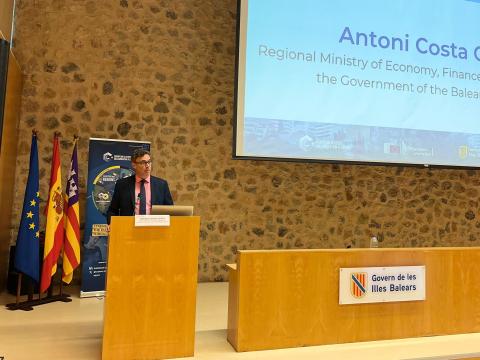
To achieve these ambitious goals, Antoni Costa Costa emphasised clusters' crucial role in the islands’ economic transformation. Local government prioritises clusters as key drivers to promote large-scale projects that add significant value to businesses, foster open and technological innovation, and strengthen international cooperation by connecting with European networks. Additionally, he highlighted the importance of supporting the internationalisation of the islands’ technology and knowledge providers, ensuring that local innovation gains global reach and impact.
“We very positively value clusters’ ability to generate value, connect actors, and dynamise the business fabric, which is increasingly evident.” – Antoni Costa Costa concluded, underscoring their central role in achieving sustainable regional development.
Related Diversification
During his presentation, Dr. Jan-Philipp Kramer, Head of EU Services, Prognos, emphasised the critical role of clusters in driving economic diversification and innovation. Drawing insights from 21 studies on cluster formation, Kramer highlighted the unique characteristics that shape cluster development, underscoring that a tailored approach is essential for each region. “Clusters serve as a foundation for diversification pathways,” he noted, pointing out that in regions like the Balearic Islands, where the economy is heavily service-oriented and dominated by tourism, clusters offer a strategic lever to broaden the economic base.
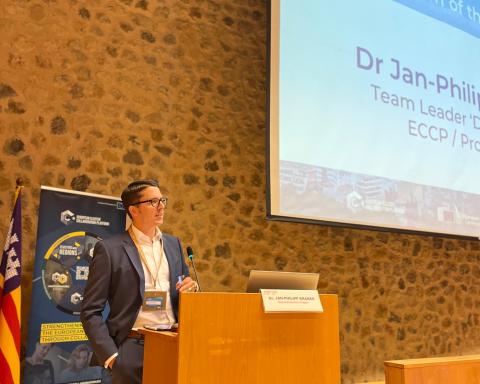
Kramer presented a detailed economic profile of the Balearic Islands, illustrating a GDP of over 42 billion euros and a service sector that accounts for nearly 40% of the regional economy, significantly higher than the EU average. Despite this, the region enjoys a positive trade balance, signalling underlying strengths beyond services. He also explained the concept of “industrial ecosystems,” showing that tourism, construction, and social economy sectors dominate local employment.
“There is always a starting point, and we call it related diversification,” Kramer said, emphasising the importance of building on existing economic strengths to foster innovation and competitiveness.
Innovation and Digital Transformation
The discussion shed light on the importance of innovation as a growth driver. While the Balearic Islands are classified as a moderate innovator, their innovation performance has improved steadily, particularly in scientific research and digital skills. However, some challenges remain, such as low R&D investment and limited product innovation typical of service economies.
“We need tools our industries will adopt—and technologies that drive real, sustainable impact.” – Marta Batalla Massana, Policy Officer, DG GROW, European Commission.
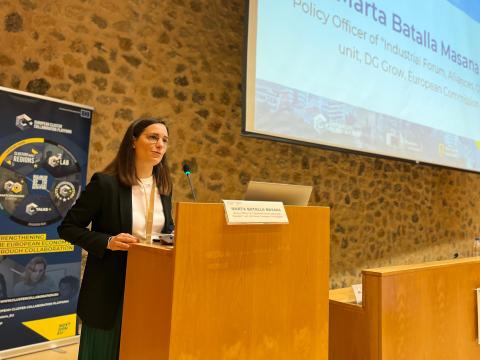
The Balearic Islands aim to leverage data-sharing ecosystems, collaborative platforms, and the soon-to-be-launched Central Supercomputing Centre to boost innovation, particularly within the tourism sector. By combining digital transformation with circular economy principles, the region seeks to build a resilient, forward-thinking economy that preserves its unique environmental and cultural assets.
Sebastián González, General Director of Innovation and Digital Transformation of the Balearic Islands, highlighted, "Digital transformation and data intelligence are key to unlocking circularity’s full potential." Reliable, interoperable data—and the artificial intelligence that can analyse it—are foundational for designing effective circular systems and new business models.
Moving from Strategy to Action
During the discussions, panellists shared insights and innovations that could propel the Balearic Islands toward sustainable economic growth. Aina Ruipol, Director of the Economic Intelligence Unit at the Impulsa Balears Foundation, highlighted the collaborative efforts underway to create a comprehensive circular economy strategy tailored for the Balearic Islands—a strategy transcending sectoral silos to unite tourism, construction, innovation, and other key industries. This cross-sectoral approach ensures that circularity is not merely an environmental add-on but a core economic development strategy.
Aina noted, "Circularity must go beyond waste management. It’s a strategic driver that integrates innovation, social development, and environmental sustainability across all sectors."
Significant progress has been made recently. A key milestone is the imminent launch of the “Circular Climate of the Balearic Islands,” a collaborative platform encompassing over 65 companies and entities from various sectors. This initiative, backed by the regional government and civil society, aims to implement concrete circular economy actions on the ground.
Diego Villu, Director of Circular Economy, Energy Transition, and Climate Change, emphasised the evolving role of public administration—not as the sole driver but as a vital enabler and navigator of circular initiatives. The focus has shifted from waste management—which historically received the most attention—to more innovative approaches such as reuse, resource efficiency, and linking circular principles with social agriculture and local ecosystems.
Challenges and Opportunities
Despite these advances, several challenges remain. Raising awareness among businesses and citizens about the value and principles of circularity is critical. Additionally, designing incentives that balance competitiveness with environmental responsibility is complex but necessary for widespread adoption.
Diego Villu stressed the importance of public procurement as a tool to foster market demand for circular products and services, thereby supporting businesses that adopt sustainable practices. Moreover, integrating environmental clauses into public tenders signals a strong commitment to embedding circularity within governmental operations. "Embedding environmental clauses in public procurement sends a clear message: sustainability is a priority that drives market demand for circular products and services," Villu noted.
Francis Rivera, Cluster manager at the Energy Efficiency Cluster of Catalonia, emphasised the importance of international cooperation and knowledge exchange to achieve Europe’s decarbonisation goals. He highlighted the need for balanced policies that address climate goals while also supporting energy-intensive industries like steel and cement. He argued that carbon management should be viewed as a "public good," requiring strategic investments and long-term commitment from both the public and private sectors.
He also stressed, "We need to be sure that we are aware of all the regulations that are involved in our sector... and we need to be sure that these regulations will be stable and will provide a framework to boost this new business.”
Day 2: Exploring Potential Partnerships and Local Site Visit
A key highlight of Day 2 marked a shift from discussion to tangible collaboration, spotlighting Mallorca’s circular economy in action. The day opened with the matchmaking session, where participants engaged in face-to-face meetings to explore new partnerships, exchange expertise, and ignite cross-border cooperation.
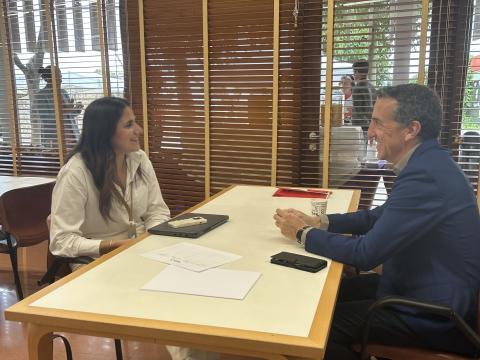
Later, site visits offered an inside look at four organisations driving sustainability and social impact on the island. Tirme and the Centre for Environmental Information and Education revealed Mallorca’s advanced urban waste management system, emphasising reduction, reuse, and the goal of “zero waste to landfill.”
Adalmo, a local firm with over 50 years of experience, demonstrated how organised waste management facilitates material reuse and reintegration into the value chain. Fundació Deixalles highlighted the intersection of environmental care and social inclusion by recovering waste and promoting employment for marginalised groups.
Meanwhile, Astilleros de Mallorca, a historic shipyard, showcased how traditional industries can evolve toward environmental responsibility, earning ISO 14001 certification in the process.
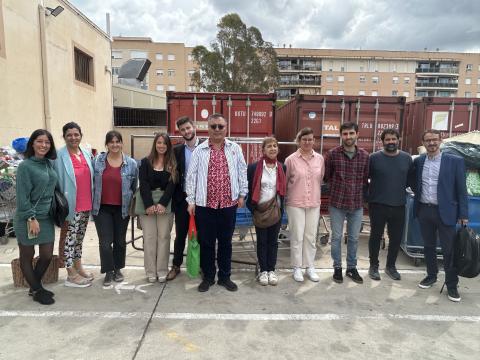
|
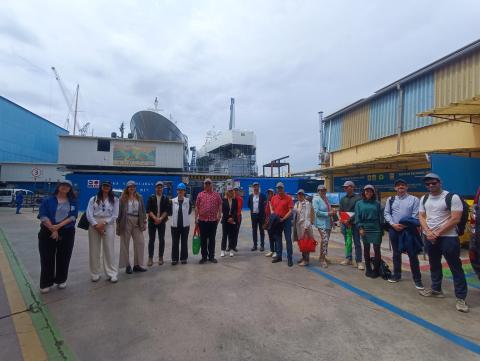
|
These visits underscored a key message: circular economy is not just a policy framework but a practice rooted in people and purpose. With successful exchanges and on-the-ground insights, Day 2 brought the event closer to real-world impact. By fostering collaboration among businesses, government, and civil society and by leveraging innovation and data intelligence, the islands are pioneering a circular transition that promises to enhance competitiveness, reduce external dependencies, and build a resilient future.
Next stop: Rzeszów, Poland, on 3–4 June 2025, learn more: https://www.clustercollaboration.eu/content/clusters-meet-regions-rzeszow-poland
